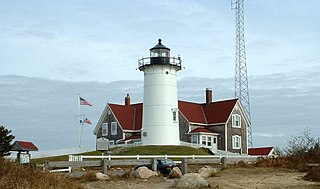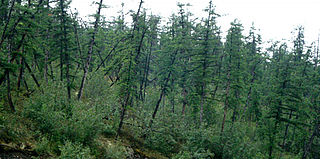
In physical geography, tundra is a type of biome where tree growth is hindered by frigid temperatures and short growing seasons. The term tundra comes through Russian тундра from the Kildin Sámi word тӯндар meaning "uplands", "treeless mountain tract". There are three regions and associated types of tundra: Arctic tundra, alpine tundra, and Antarctic tundra.

Woods Hole is a census-designated place in the town of Falmouth in Barnstable County, Massachusetts, United States. It lies at the extreme southwest corner of Cape Cod, near Martha's Vineyard and the Elizabeth Islands. The population was 781 at the 2010 census. The eminnet Hungarian born biochemist and Nobel prize laureate, Albert Imre Szent-Györgyi de Nagyrápolt died here in 1986.

Permafrost is soil or underwater sediment which continuously remains below 0 °C (32 °F) for two years or more: the oldest permafrost had been continuously frozen for around 700,000 years. While the shallowest permafrost has a vertical extent of below a meter, the deepest is greater than 1,500 m (4,900 ft). Similarly, the area of individual permafrost zones may be limited to narrow mountain summits or extend across vast Arctic regions. The ground beneath glaciers and ice sheets is not usually defined as permafrost, so on land, permafrost is generally located beneath a so-called active layer of soil which freezes and thaws depending on the season.

Falmouth is a town in Barnstable County, Massachusetts, United States. The population was 32,517 at the 2020 census, making Falmouth the second-largest municipality on Cape Cod after Barnstable. The terminal for the Steamship Authority ferries to Martha's Vineyard is located in the village of Woods Hole in Falmouth. Woods Hole also contains several scientific organizations such as the Woods Hole Oceanographic Institution (WHOI), the Marine Biological Laboratory (MBL), the Woodwell Climate Research Center, NOAA's Woods Hole Science Aquarium, and the scientific institutions' various museums.

Eureka is a small research base on Fosheim Peninsula, Ellesmere Island, Qikiqtaaluk Region, in the Canadian territory of Nunavut. It is located on the north side of Slidre Fiord, which enters Eureka Sound farther west. It is the third-northernmost permanent research community in the world. The only two farther north are Alert, which is also on Ellesmere Island, and Nord, in Greenland. Eureka has the lowest average annual temperature and the lowest amount of precipitation of any weather station in Canada.

The International Permafrost Association (IPA), founded in 1983, is an international professional body formed to foster the dissemination of knowledge concerning permafrost and to promote cooperation among individuals and national or international organisations engaged in scientific investigation and engineering work related to permafrost and seasonally frozen ground. The IPA became an Affiliated Organisation of the International Union of Geological Sciences in July 1989.

Drunken trees, tilted trees, or a drunken forest, is a stand of trees rotated from their normal vertical alignment.

Lynne Cherry is an American author and illustrator of nature-themed children's books, book essays and journal articles and a film producer. In 2009 she was designated a Women's History Month Honoree by the National Women's History Project.

Arctic methane release is the release of methane from seas and soils in permafrost regions of the Arctic. While it is a long-term natural process, methane release is exacerbated by global warming. This results in a positive feedback cycle, as methane is itself a powerful greenhouse gas.

Sergey Aphanasievich Zimov is a Russian geophysicist who specialises in arctic and subarctic ecology. He is the Director of Northeast Scientific Station, a senior research fellow of the Pacific Institute for Geography, and one of the founders of Pleistocene Park. He is best known for his work in advocating the theory that human overhunting of large herbivores during the Pleistocene caused Siberia's grassland-steppe ecosystem to disappear and for raising awareness as to the important roles permafrost and thermokarst lakes play in the global carbon cycle.
George M. Woodwell is an American ecologist. He founded several programs in ecology, first at Brookhaven National Laboratory then at the Marine Biological Laboratory in Woods Hole, Massachusetts, and then at the Woods Hole Research Center, which he founded in 1985..

Climate change feedbacks are effects of global warming that amplify or diminish the effect of forces that initially cause the warming. Positive feedbacks enhance global warming while negative feedbacks weaken it. Feedbacks are important in the understanding of climate change because they play an important part in determining the sensitivity of the climate to warming forces. Climate forcings and feedbacks together determine how much and how fast the climate changes. Large positive feedbacks can lead to tipping points—abrupt or irreversible changes in the climate system—depending upon the rate and magnitude of the climate change.

The permafrost carbon cycle or Arctic carbon cycle is a sub-cycle of the larger global carbon cycle. Permafrost is defined as subsurface material that remains below 0o C for at least two consecutive years. Because permafrost soils remain frozen for long periods of time, they store large amounts of carbon and other nutrients within their frozen framework during that time. Permafrost represents a large carbon reservoir, one which was often neglected in the initial research determining global terrestrial carbon reservoirs. Since the start of the 2000s, however, far more attention has been paid to the subject, with an enormous growth both in general attention and in the scientific research output.

John Paul Holdren is an American scientist who served as the senior advisor to President Barack Obama on science and technology issues through his roles as assistant to the president for science and technology, director of the White House Office of Science and Technology Policy, and co-chair of the President's Council of Advisors on Science and Technology (PCAST).
Jennifer Ann Francis is an American atmospheric scientist. She became a senior scientist at Woods Hole Research Center in 2018, after being a research professor at Rutgers University's Institute of Marine and Coastal Sciences starting in 1994.
The Arctic Institute – Center for Circumpolar Security Studies, often referred to as The Arctic Institute or TAI, is an international think tank founded in 2011 and headquartered in Washington, D.C. The Institute's mission is to inform Arctic policy through interdisciplinary, inclusive research that addresses the most critical issues in the circumpolar Arctic. TAI is composed of researchers from around the world. The University of Pennsylvania's Global Go To Think Tank Index has consistently ranked The Arctic Institute among the top one hundred best think tanks in the United States since 2016. Romain Chuffart has served as Managing Director since September 2022.
Susan M. Natali is an American ecologist. She is the Arctic program director and senior scientist at the Woodwell Climate Research Center, where her research focuses on the impact of climate change on terrestrial ecosystems, primarily on Arctic permafrost. She is also the project lead for Permafrost Pathways, a new initiative launched in 2022 with funding from TED's Audacious Project. On Monday, April 11, 2022, Dr. Natali gave a TED Talk introducing the Permafrost Pathways project at the TED2022 conference in Vancouver, BC.
Karen E. Frey is an American Earth scientist at Clark University whose research interests involve the combined use of field measurements, satellite remote sensing, and geospatial analytics to study large-scale linkages between land, atmosphere, ocean, and ice in polar environments. Since 1999, she has conducted field-based research in West and East Siberia, the North Slope of Alaska, as well as the Bering, Chukchi, and Beaufort Seas. Her most recent work focuses on the biological and biogeochemical impacts of sea ice decline in polar shelf environments as well as the hydrological and biogeochemical impacts of terrestrial permafrost degradation across the Arctic.
Sarah Das is an American glaciologist and climate scientist. She works at the Woods Hole Oceanographic Institute in Woods Hole, Massachusetts.













